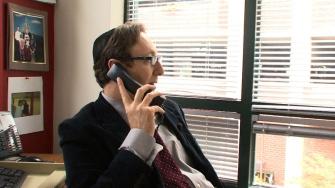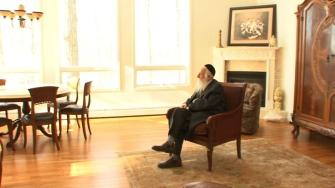By Andrea Appleton
Baltimore City Paper
March 9, 2011
http://citypaper.com/news/silent-no-more-1.1116004
 |
| Phil Jacobs |
 |
| Rabbi Abraham Twerski, a psychiatrist interviewed in standing silent |
 |
| A courtroom sketch from Yisroel Shapiro’s trial on charges of sexual molestation |
Late last month, Phil Jacobs, executive editor of the Baltimore Jewish Times, was packing his bags and feeling anxious. He was on his way to the Atlanta Jewish Film Festival. Standing Silent, a documentary directed by Scott Rosenfelt—producer of Home Alone, Mystic Pizza, and Smoke Signals, among many others—chronicles Jacobs' several-year quest to expose sexual abuse within Baltimore's insular Orthodox Jewish community. The Atlanta film festival had been one of the first to accept it, and was the first Jacobs would attend.
"So this movie's coming out," Jacobs said. "I keep pushing it away and pushing it away and it's almost time." His articles on sexual abuse had named the names of perpetrators, a taboo in the eyes of some in the Orthodox Jewish community, to which Jacobs belongs. Some had accused him of lashon hora, the Hebrew term for negative speech that harms another, a serious sin. The documentary was bound to rekindle some of these feelings in his critics. But there was another, more personal reason Jacobs was feeling anxious. It was perhaps the same reason he'd pursued his sexual molestation series for so long and with such drive: As a young man, Jacobs was raped.
Sexual abuse within the Catholic Church has been a topic of public debate for at least a decade, but word of molestation in the Orthodox Jewish community has been slower to emerge, often because its members have had a tendency to keep such scandal under wraps. But, increasingly, publications such as New York City's Jewish Week have begun to explore the topic, while victims have started going to the police. In the last several years, at least four books have been published on sexual molestation in the Orthodox world, and several prominent rabbis have publicly addressed the need for the community to face the problem. In Baltimore, the dubious privilege of shining a light on the subject has fallen to Jacobs.
"I didn't know that I was going to become the molestation writer of Jewish Baltimore," he says. It was more or less thrust upon him, he says, perhaps by God. Four or five years ago, Jacobs took part in a self-help group for Jewish, mostly Orthodox, victims of molestation. There were about 18 men and women present, and each told his story. "I knew almost everybody in the room," Jacobs says, "and it was just very, very gut-wrenching."
After the meeting, one participant called Jacobs and asked him to write an article about what had happened to him. "I didn't know if I could handle it," Jacobs says. "But I played the reporter and listened to him." The young man's experience hit so close to home that Jacobs let the notebook sit in a drawer for months, unable to face writing the article. The young man kept calling. "He kept noodging me and pushing me and finally I said, 'OK, I'll do the story,'" Jacobs says. In February 2007, "Today, Steve is 25" was published.
Suddenly, people who claimed to be victims of molestation were stopping Jacobs in the grocery store, waylaying him at the gym, e-mailing him. "It would be a Sunday afternoon, I'd promise my family it was just gonna be us," Jacobs says. "And the phone would ring, and I would be in the dining room back on the phone listening to yet another story."
That March, Jacobs traveled to Florida for Orioles spring training with his friends Bob and Scott Rosenfelt, an annual ritual. Because of his history of abuse, Jacobs is unable to sleep alone in a room with another man, so booking accommodations tends to be awkward. "My brother Bob used to say, 'Make sure when you get rooms for people, you always gets a single room for Phil,'" Scott Rosenfelt remembers. "A couple years like that and I was like yeah? So what, everybody wants a single room. So I said to my brother, 'What's the big deal?'"
This was how Rosenfelt learned Jacobs had been a victim of child abuse. "It was about that time that Phil started writing these articles for the Jewish Times," he says. "Coupled with me understanding his own personal background and then realizing what he was doing professionally. . . ."
Rosenfelt decided then and there that it was time to make his first documentary. By the end of 2007, a small film crew was trailing Jacobs at home, at work, even on a trip to visit his daughter in Israel. And by that time, Jacobs' stories had generated some drama.
In April 2007, he published the first in a series of articles about a deceased member of Baltimore's Orthodox Jewish community named Rabbi Ephraim F. Shapiro. He was a highly respected man; some 700 people attended his funeral in 1989. The article quoted three men who claimed to be Shapiro's victims, and suggested that Shapiro could have molested hundreds. "If you are a survivor or if you know of someone who survived any sexual molestation, you have an audience here," it read.
The backlash was overwhelming. Ladies stopped Jacobs in the grocery aisles to scream at him for publishing the name of a man who could no longer defend himself; rabbis counseled him not to publish any more articles. Rabbi Moshe Heinemann, head of Star-K, a local kosher certifying agency and one of the largest in North America, called for a ban on the Baltimore Jewish Times. His letter called the article "vicious" and read in part "[I]t is my opinion that it is totally inappropriate for this publication to be found in any Jewish home."
"That story came out and that's when I realized I was in a dog fight," Jacobs says. People who claimed to be victims came out of the woodwork, alleging that this or that well-known figure in the community had molested them: Shapiro, or Rabbi Jacob Max, founder of an important Pikesville synagogue, or other prominent figures. The allegations against Max were a particular shock for Jacobs. Max was his wife's family rabbi. "This is a man who married my wife and I," he says. "His name is on our marriage contract."
And every time Jacobs wrote a story, the blogs lit up with accusations. "Do you take lightly the embarassment [sic] caused to family members by the recent article in the Jewish Times?" read one on the blog FailedMessiah, concerning an article about Rabbi Shapiro. "The Halacha says that embarrasing [sic] someone in public is similar to murder."
Another comment, in regard to an article about another alleged offender, reads: "The problem is, the big problem is, that we follow a Torah and Phil Jacobs claims he does too. Watergate and rules of so called journalism are irrelevant. What he did is absolutely forbidden according to the Torah."
To Rosenfelt, that tension between Jacobs' role as a journalist and his role as an observant Jew—not to mention his own history with sexual abuse—made him a great character for a documentary. "He's conflicted, he has obligations in different worlds," he says. "And he made a choice for humanity, not just for his religion."
Rosenfelt says he's signed a distributor and aims to show the movie—which was partially funded by a Sundance Institute Documentary Film Program grant—at other festivals and potentially on television venues like HBO. At the moment, there are no firm plans to screen it in Baltimore. But, Rosenfelt says, it will likely make waves here one way or another. "I make films that people actually see," he says.
Jacobs allowed the film crew near-total access. It helped that Rosenfelt had more than a passing familiarity with the local Jewish community through his brother Bob, who is Orthodox and Jacobs' closest friend. "It was as if this was an anthropological documentary and I had to live with the tribe for five years before they trusted me," Rosenfelt says. "It's kinda what happened. I got to know these people for 20 years, didn't know I was gonna do this. When it came time, I think it was much better it was me than somebody else shoving the microphone in people's faces."
The film crew is there as Jacobs interviews alleged victims. The cameras are rolling when Jacobs calls Max to tell him he's been accused of molestation. ("In my lifetime I never molested anyone," Max responds. "This is stupid from stupid land." By the end of the film, Max has been convicted of sexually molesting a woman half his age.) In one scene, Jacobs weeps with joy after hearing about the arrest of a man named Yisroel Shapiro—Rabbi Ephraim F. Shapiro's son—on charges of sexual molestation. "We got him," he says, hugging his publisher. Later he tells his therapist: "For me it's the manifestation, as if Big Bob [his own abuser, an ice cream truck operator] had been put in jail."
This sort of emotional investment is not what's expected from a reporter, but Jacobs is unapologetic about his advocacy. He says his editor and therapist were there to make sure he maintained his objectivity, and that the Jewish community has had a wake-up call. "We all drank the Kool-Aid that this doesn't happen to Jews," he says. "We've learned that if it happens to Catholics, it happens to Jews. It happens to everybody ."
Critics—on the blogs and elsewhere—have accused him of publishing articles about alleged child abusers without hard evidence, relying on the word of self-proclaimed victims. But Jacobs says there were too many people corroborating the stories to ignore. "The same names kept popping up, and I wasn't looking for them," he says. "It's not like I was hunting for them." He says there was more than one story he didn't write because he felt he didn't have enough proof.
The personal repercussions of the series have been huge. Jacobs says he's lost friends and is no longer comfortable in places that were once central to his life. "It's really gallant to say, 'Boy, I'm glad I found that out,'" he says of the incidence of sexual abuse within the local Jewish community. "Well, it really sucks to find it out." There are, nevertheless, more articles to come on the subject in the Jewish Times, including one currently held up by legal concerns. He is also writing a book called The Ice Cream Man about his own experience of abuse. The response to these endeavors from certain sectors of the Jewish community is unlikely to be sympathetic, but Jacobs is at peace with that.
"I stop and think a lot and I realize that I don't feel estranged from God," he says. "Do I feel estranged from certain people within the Baltimore Jewish community? Yes I do. And certain places in the community? Yes I do. But that's their problem, not mine."
Any original material on these pages is copyright © BishopAccountability.org 2004. Reproduce freely with attribution.